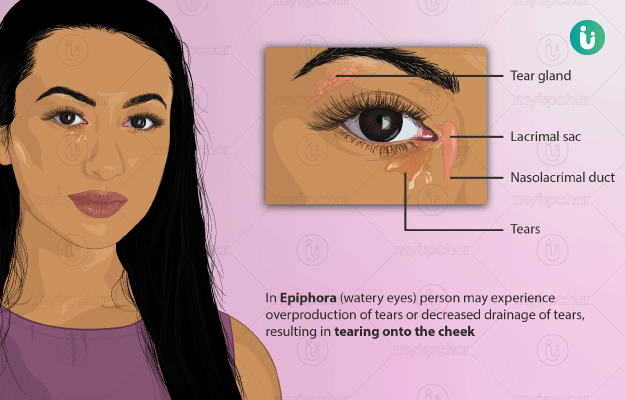What are watery eyes?
Watery eyes are generally the symptom of an underlying condition. It occurs when too many tears are produced or are not drained properly. Tears help in washing away foreign particles like dust from your eyes and keep your eyes moist. However, excessive and uncontrolled watering of the eyes can be due to some eye condition or an allergy. The eye is a sensitive and vital part of the body, and consulting a doctor is the right step in case any such problem is experienced.
What are its main associated signs and symptoms?
The symptoms associated with watery eyes are:
- Swollen margins of the eyelids
- Redness of eyes
- Itching of eyes
- Sensation of a foreign body in the eye
- Irritation in the eye
- Pain in the eye
- Blurry vision
- Headache
- Sensitivity to bright light
What are the main causes?
The most common cause is dry eyes. This is because your eyes start to produce more tears to reduce the itchiness caused due to dry eyes. Other causes include:
- Conjunctivitis
- Infection
- Blocked tear duct
- Inward or outward turned eyelids
- Dust and mould allergy
- Bright light
- Foreign matter like dust in the eye
- Irritation or injury
- The growth of eyelashes in the inward direction
- Presence of chemicals in the surroundings
Increased watering of eyes sometimes happens with laughing, yawning, vomiting and eye strain.
How is it diagnosed and treated?
The doctor will diagnose the cause of the watery eyes by asking a few symptom-related questions and performing an eye examination. The doctor may perform a penlight examination of the eye to check the soft tissues in and around the eye. The doctor may also recommend certain eye tests to confirm the diagnosis.
Treatment is completely based on the cause of the watery eyes. If the watering is due to some eye condition, there are current advanced therapies to treat most of them. If it is due to an allergic reaction, treating the allergy or irritation reduces the watering of the eye.
Any foreign body in the eye can be removed by the ophthalmologist. Lubricant eyedrops are advised for dry eyes. Antibiotic eyedrops may be given for a bacterial infection. Surgery may be required for conditions like blocked tear duct and problems with the eyelids.

 Doctors for Watery Eyes
Doctors for Watery Eyes  OTC Medicines for Watery Eyes
OTC Medicines for Watery Eyes



















